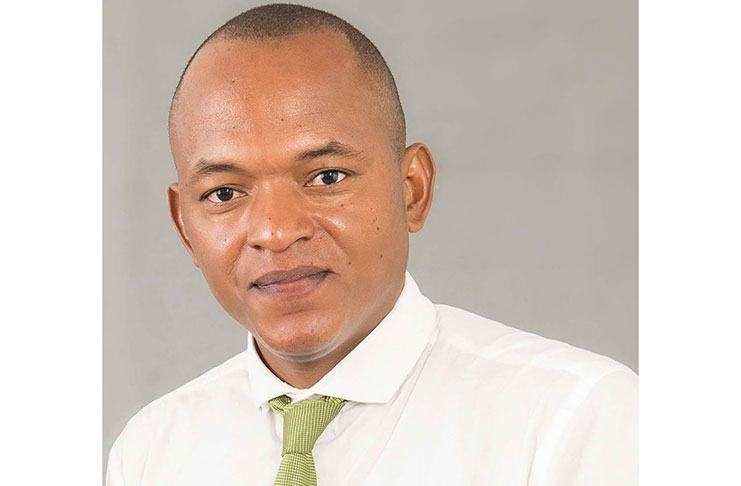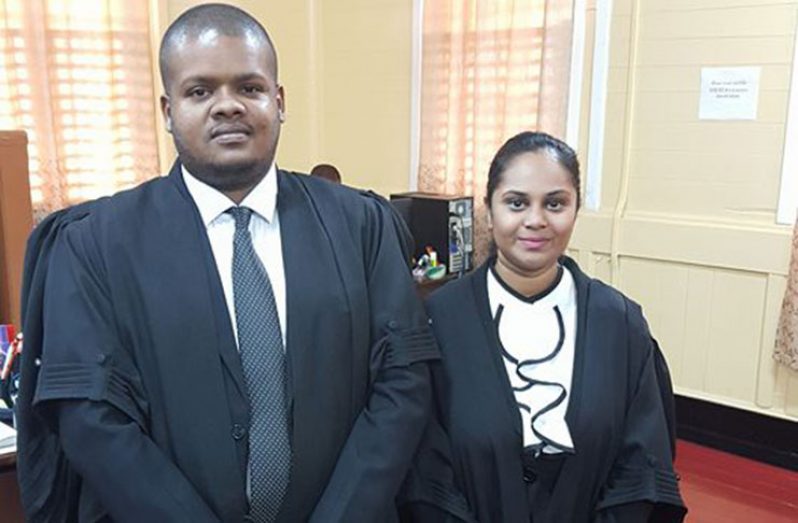— but lawyers call for due diligence
THE announcement by the Government of Guyana on Tuesday that it is partnering with the University College of the Caribbean/ Law College of the Americas to establish a law school here has been welcomed by many with open arms, though some warn that due diligence must be done by the administration.
Over the years law students have faced many challenges after completing their Bachelor of Laws (LLB) at the University of Guyana (UG) over three years.

For many, the cost to attend the prestigious Huge Wooding Law School to obtain the Legal Education Certificate (LEC) is unaffordable, while for others though they have satisfied the matriculation requirements, they are unable to gain access to the institution because of the cap of 25 top students being guaranteed places.
There are approximately 80 students reading for their LLBs at UG and of the lot only 25 are guaranteed entry to the University of the West Indies Hugh Wooding Law School.
As such, the announcement that efforts are ongoing to ensure that Guyana has its own law school has received overwhelming support from many; but that support is not without questions.
President of the University of Guyana Law Society, Chevy Devonish, told the Guyana Chronicle on Thursday that the “initiative is a good one.”
He explained that having a law school in Guyana would “make things simpler for Guyanese students, financially and in other areas.” Devonish said too those students who are set to graduate from the University of Guyana this year are already “weighing their options.”
“Persons are looking to make a decision on the next step,” he said, while noting that there are many questions as to how the law school will function.
Though in its early phase, the Government has announced that it is eyeing the opening of the law school next year and Attorney General Basil Williams has said the school will operate under the Council of Legal Education, thereby ensuring it is regulated and has oversight. He said with the regional accreditation, graduates would be able to practise in all jurisdictions in the Caribbean.
The President of the Law Society said too that while the move is welcomed, it is important that the Government does its due diligence, noting that not many persons are familiar with the University College of the Caribbean / Law College of the Americas which is headquartered in Jamaica.

“We have to look at the reputation of [the] Jamaican school… just to ensure there is the confidence,” said Devonish, who noted that it is critical that all areas are clear, so that students do not find themselves in worrying situations in the future.
INFORMATION
“People must have certainty, information must be readily available…people must know that they would not be confined to practising law in Guyana,” he added.
Devonish said he looks forward to hearing more about the JOF Haynes Law School with optimism.
Like Devonish, a graduate of UG’s Law Programme told the Guyana Chronicle that the establishment of the school would be a step in the right direction. Speaking on condition of anonymity, she said she completed her Law Degree in 2014, but has not been able to gain entry to Hugh Wooding Law School.
“I believe it’s a step in the right direction, which for the most part promises to bring an end to the obvious difficulties law students face on a yearly basis. I’ve always viewed to be inherently unfair, the automatic-25 entry process which applies to the Hugh Wooding Law School.”
She believes that once more than 25 students are enrolled in the LLB programme at UG (which has always been the case), “then it begs the question, what happens to the others.”
“And so to have our own local law school, would be quite an achievement, not only for students-at-law, but for us as a people, to have such an institution which we can call ours.”
Similarly, Sherod Duncan, who also studied law at UG and graduated in 2014, believes that

“the idea of a local law school is an idea whose time has come” and sang praise to the APNU+AFC Administration for “working hard to deliver on a promise made while it occupied the Opposition benches.”
“This means that Guyanese and foreign nationals who read for their LLB here can complete law school and practise without being hampered by an unfair quota system or an even more limiting entrance exam process to attend Hugh Wooding or other law schools,” said Duncan, who expressed optimism that the cost of the programme will be “very competitive” and “it will also be a definite advantage to local students with the savings, not having the high cost attached to living elsewhere in the Region.”
Attorney Nikhil Ramkarran is of the opinion that if the law school is properly established, then it would be a “godsend to a lot of students taking that track.”
LEAD, RATHER THAN FOLLOW
He argued that it would not only be beneficial to those interested in a legal career but to the country. “It’s time we attempt to lead rather than following,” he declared, adding that
Guyanese students are badly treated in the Caribbean.
“I hate the idea that our hardworking and diligent students are being treated like poor cousins to the rest of the Caribbean,” Ramkarran added, while stressing that his views are all dependent on the school being “properly established and funded.”
But while there are those for the establishment of a law school here, there are those of the view that Government’s efforts should be channelled elsewhere.
Attorney Mayo Robertson, one of the first batch of West Indian-trained lawyers to graduate in 1971, told this publication that he has some concerns with the decision.
Robertson is of the opinion that the Government has to prioritise whether it wants to graduate “30 to 40 new lawyers every year as opposed to spending money on other aspects of university education.”
He pointed to the deplorable state of affairs at the University of Guyana and noted that more money could be spent on the Department of Technology.
“It might be a prestigious thing to say we have a local law school, but in terms of the economics and also in terms of the calibre of the law school, you might want to tread cautiously,” the lawyer added.
He said above all, he is a strong believer in regional integration and noted that those, like himself, who were fortunate to go to law school with people around the Region “found the experience invaluable.”
“Only time will tell,” he said, not wanting to be a pessimist, but questioned the need to graduate more than 60 lawyers annually, given that the average age of graduates is 21.
“Every country must prioritise their needs,” he added, but believes the Government should continue to pay its contributions to the Council of Legal Education, so that students are guaranteed the 25 slots under the agreement.
He believes that would prove less expensive than the establishment of a school here.
Similarly, Attorney Everton Singh-Lammy said he read of the move to establish a law school here in the media and is hesitant to comment given the little information available thus far.
“However, if it is coming to fruition, I would hope that all of the variables are considered. Like, can the market (either Guyanese or Caribbean) accommodate a large influx of lawyers? Of course, that has to be balanced with the need to ensure that dreams and aspirations of becoming a lawyer are not stifled,” he stated.
Government on Wednesday signed a Memorandum of Understanding (MoU) with The University College of the Caribbean / Law College of the Americas to enter into discussions with the aim of jointly establishing a law school here to serve the people of Guyana and the wider Caribbean.
The MoU, which serves as a starting point for negotiations on the project, speaks to the joint ownership of the JOF Haynes Law School at a ratio of 70:30 with The University College of the Caribbean/ Law College of the Americas being a 70 per cent shareholder and the Government 30 per cent. A feasibility study will be conducted by a “competent professional” to ascertain the viability of the project.




.png)










1 thought on “Local law school welcomed”
I have a hard time wrapping my head around a law school in Guyana. There are so many other needs I believe any resources spent in the law area would be better spent in other areas to leverage the dollars and resources invested.
How about better tech institutes that produces better trade graduates (welders, mechanics, coders, programmers, etc) or ag folks for better crops and animal husbandry. These areas exist, but need resources.